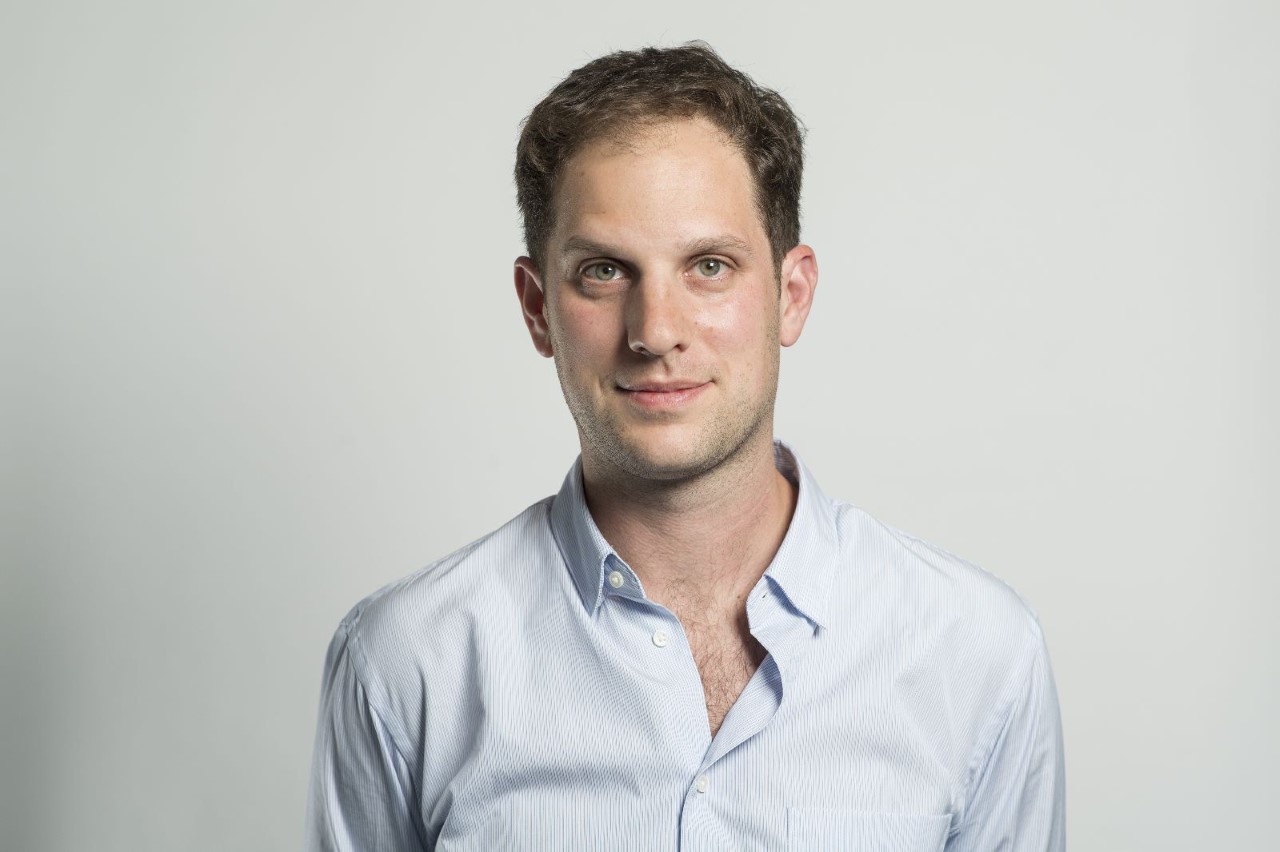Evan Gershkovich felt it was his “duty” to document a country shaped by war and repression. Then he was arrested

Evan Gershkovich. Courtesy: Wall Street Journal.
In a tweet he posted on 12 July 2022, American journalist Evan Gershkovich made a rare personal observation. “Reporting on Russia is now also a regular practice of watching people you know get locked away for years,” he wrote. Gershkovich had posted the comment below a screenshot from one of his own stories for the Wall Street Journal, where he is a Russia correspondent. The piece is a portrait of a wartime Moscow summer, as Muscovites drank, did yoga and ignored the bombing of Ukraine with a determination that tipped into the surreal.
The story quoted Ilya Yashin, one of the few prominent opposition politicians not in jail at the time. Yashin had openly criticised the invasion and predicted during the interview that he was about to be arrested again. Shortly after, his premonition came true.
Eight months after that tweet, it was Gershkovich who was arrested in the city of Yekaterinburg while reporting on one of his stories. His newspaper vehemently denied any allegations against him and called on the Russian government to release him from jail. “No reporter should be detained for simply doing their job and our team continues working around the clock in seeking his safe and swift release,” said Almar Latour, CEO of parent company Dow Jones, a few hours after Gershkovich’s arrest.
A true reporter
The tweet Gershkovich posted in July was rare, both because he tends to shy away from putting himself in the story and also because of his obvious dismay. A gregarious chatterbox who texts friends Russian memes and updates about his beloved Arsenal even in the midst of tough assignments, he is known by both friends and colleagues for his infectious energy, even his optimism.
But they also say that he was not naive about Russia’s trajectory in the months after the country invaded Ukraine or about the rising risks of reporting on the ground even for foreign journalists, who relied on a level of protection Russian reporters could not. Many of his colleagues and friends had left the country. And yet, after a stint in London when the war broke out, Gershkovich still had a visa and journalist accreditation from the Kremlin. He felt deeply that it was his duty to stay in Russia and keep reporting on the ground.
“Nobody benefits from no one knowing what’s going on in Russia. That was his thought process,” says Pjotr Sauer, Russian affairs reporter at the Guardian and a close friend. “He felt like it was his professional duty to document how the country is changing.”
The Russian government has held Gershkovich in the notorious Lefortovo prison in Moscow. The Kremlin is accusing him of espionage without providing any evidence for its claims. The Journal and other media outlets have defended him as a reporter who is simply doing his job. Dozens of journalists and news organisations have called for his release.
Gershkovich is the first American reporter to be arrested by Russian authorities since the Cold War, but far from the only journalist who is in prison in the country. In 2022, the number of journalists detained around the world hit a fresh record of 363, according to the Committee to Protect Journalists. At least 19 journalists were imprisoned in Russia alone by the end of 2022.
From New Jersey to Moscow
Gershkovich arrived in Russia in 2017, after giving up a news assistant job at the New York Times in favour of on-the-ground experience at the Moscow Times. In many ways, it was a deeply personal decision, friends say. Raised in New Jersey by Soviet émigré parents, he had grown up speaking Russian and immersed in Russian culture, an experience he wrote about for Hazlitt in 2018.
This identity also drew him to many of his friends, including Linda Kinstler, a classmate at Bowdoin College who edited his pieces at the college paper and later covered Ukraine for The New Republic. Her parents, too, had emigrated from the Soviet Union, which helped build a connection between them. As their careers progressed, he would often turn to her for career and writing advice.
“He was really determined to be a journalist, basically starting right after he graduated. He really knew what he wanted to do and knew what it would take to get there,” she says, describing that time.
That drive to be a journalist was paired with Gershkovich’s fascination with Russia. Many friends describe his passion for the country as not just a job but an obsession, consuming most of his reading habits and much of his leisure time too.
Before leaving New York for Moscow, Gershkovich, who had cooked in kitchens after college, would shower his room mates with home-cooked Russian meals, often as incentives to get them up early in the morning to watch Arsenal games, says Jeremy Berke, a close friend who lived with him after college and who now writes a newsletter about the cannabis industry.
Once Gershkovich arrived in Moscow, Berke recalled receiving ecstatic selfies from him taken from the banya [a Russian sauna] or out around the city. On visits back to New York, Gershkovich coaxed friends onto bikes for trips to Brighton Beach for yet more Russian food and carafes of vodka, followed by a “wobbly” ride home, Berke said.
This fascination with Russian culture hadn’t dimmed after years in the Moscow press corps.
“He actually is passionate about Russia, about Russians, about the country’s history,” says Georgi Kantchev, a Wall Street Journal reporter in Berlin who first met him when he was based in Moscow. “It goes beyond what a typical journalist does for their beat.”
A rushed exit
In February 2022, one month after joining the Wall Street Journal from AFP, Russia invaded Ukraine. Gershkovich was sent to London, where he would stay for months, unsure if he could return to Russia even to collect his belongings. At first, friends were able to look after his things, he told Eliot Brown, a London colleague and a finance reporter at the Journal. But soon, potential subletters had fled the country too.
“It became, ‘I basically know no one left in Moscow’,” says Brown. This period of uncertainty was excruciating for Gershkovich, colleagues say, but his own preferences were clear: he wanted to go back.
Many of them understood. “We bonded over the fact that we were kind of exiled from the countries that we were covering, because I got kicked out of China, and he wasn't sure whether he'd be able to go back to Russia,” says Stu Woo, a reporter in London who was one of several Journal staffers to have their press credentials revoked in 2020, while he was a Beijing correspondent. “He loved Russia in the same way that I loved China,” Woo says. “You just go there and you learn, why are my parents like that, basically.”
Back to Moscow
Gershkovich made his way back to Moscow, kicking off an even more prolific period of work. As the remaining independent Russian journalists were forced to flee and cover the country from exile, a small handful of foreign correspondents were able to continue to report independently on the ground, even as authorities cracked down even further on any signs of dissent.
As sources retreated out of fear, Drew Hinshaw, a senior world reporter at the Journal who has worked closely with Gershkovich, says his colleague drew on his greatest skill as a reporter: his uncanny ability to talk to almost anyone about anything, and keep talking long after others had stopped.
“He’s a dude from New Jersey,” Hinshaw says with a laugh. Gershkovich tends to use informal Russian even with high ranking sources, and was often spotted at stiff press conferences in sneakers and jeans. Counterintuitively, this approach tended to endear him to people, many colleagues said, creating a sense of informality that belied just how hard he works. Common Gershkovich anecdotes include the four days he spent in a tent reporting on out-of-control Siberian wildfires for the Moscow Times, and the hours he spent with doctors as the pandemic accelerated, revealing in the process that many were still only medical students.
Valuable reporting on Putin's circle
At the end of 2022, Gershkovich along with his Journal colleagues produced a blockbuster feature on the narrowing inner circle of Putin, revealing just how little accurate information reaches the Russian leader. Gershkovich did the bulk of the work, Hinshaw says. At the same time, he was helping other colleagues with reporting on the sly, says Brown, and denying reporting tags to evade editors who had told him to stop helping others and focus on his own work.
As the war stretched on, though, friends say the stories he kept coming back to were the ones that examined how Russian society was changing under wartime, and the ethical questions everyday people increasingly faced.
Polina Ivanova, a close friend and a correspondent for the Financial Times who now covers Russia and Ukraine from Berlin, pointed to a story he wrote early in the war, about a police officer sentenced to ten years in prison for speaking out to friends. “One of the most important topics in Russian society at the moment is the story of one person trying to remain decent when the whole society is getting more and more totalitarian,” she says. “And that’s what that story is about.”
Gershkovich also covered the cases of other detainees, and openly talked to colleagues about the ethical dilemmas of covering stories where hostages were later traded.
Now, many of those same colleagues are in the deeply uncomfortable position of reporting on their friend’s arrest and its broader geopolitical implications while also campaigning for his release. Ivanova and several other friends are coordinating a letter writing campaign, asking friends, supporters and other journalists, particularly those who understand what it’s like to be detained, to write to him; the group will translate the letters into Russian as required by law.
Although the exact reasons behind his arrest weren’t clear at the time of writing, those journalists are also painfully aware that his detention is a warning to other journalists—and will directly threaten their ability to get independent news out of Russia, and depict how life is really unfolding inside the country.
“I can’t imagine the richness Russia was covered with before the war,” says Thomas Grove, a Journal reporter in Warsaw who has worked closely with Gershkovich and has covered Russia for more than a decade. “It’s changed so much. We’re going to have a hard time finding pieces that really get under the skin of Russian society.”
On the evening of Monday 3 April, after a long wait, there was finally some good news. Ivanova tweeted out that Gershkovich’s friends had finally received word from the jail through a Russian observer who had managed to visit him. He is reading Life and Fate by Vasily Grossman, she reported – a sprawling tale of a Soviet family shaped by World War II and threatened by totalitarian states. Written by a Ukrainian Jew and once confiscated by the KGB, it’s considered a masterpiece. It had been a favourite of Gershkovich on a recent holiday. When visited in jail, he was also making jokes, Ivanova said, “because of course he is.”
In every email we send you'll find original reporting, evidence-based insights, online seminars and readings curated from 100s of sources - all in 5 minutes.
- Twice a week
- More than 20,000 people receive it
- Unsubscribe any time






